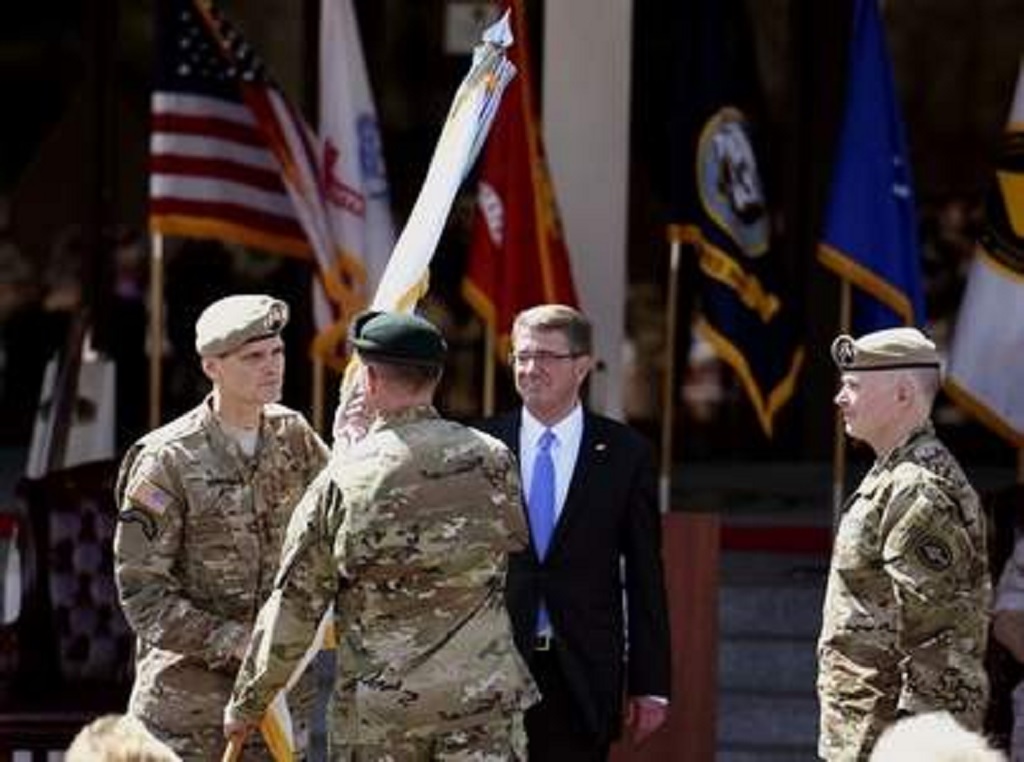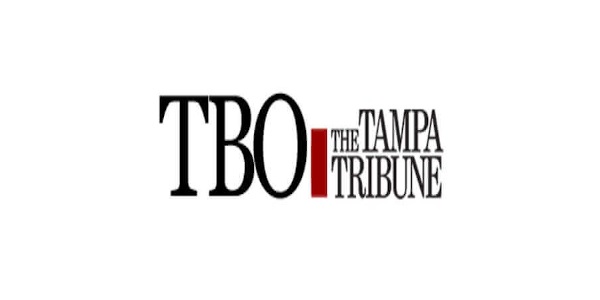The Tampa Tribune / TBO.com

Looking on are Secretary of Defense Ash Carter, center, and incoming Socom commander Gen. Raymond Thomas III. CHRIS URSO/STAFF
TAMPA — Army Gen. Joseph Votel had a busy and historic day Wednesday, one that highlighted the continuity of leadership and the importance of commandos as a force in the ongoing fight against jihadis.
At a change of command ceremony at MacDill Air Force Base, attended by Defense Secretary Ash Carter, Joint Chiefs Chairman Marine Gen. Joseph Dunford and other top military leaders, Votel assumed command of U.S. Central Command from retiring Army Gen. Lloyd Austin III.
It’s the first time a Socom commander has been put in charge of Centcom.
In the morning, Votel, 57, relinquished command of U.S. Special Operations Command, which he held since August 2014. Votel handed the Socom reins to Army Gen. Raymond “Tony” Thomas during an 11 a.m. ceremony at MacDill.
Votel has been widely lauded as a good choice to run Centcom for his overall military background, understanding of the Centcom region and Washington D.C. policy making. But beyond that, two of the top combatant command leaders in the battle against jihadis are now Army generals with extensive experience in the world of special operations.
During both ceremonies, Carter lauded Votel for his “experience with all elements of the joint force — air, sea, ground, special operations, also cyber and space.”
Carter also remarked that Votel has an “extensive experience and deep understanding of the Centcom area of responsibility.”
And he has the “politico-military skills and strength as warrior-diplomat,” said Carter. “We have important partners and allies in the region, including Israel,” which is not in the Centcom area of responsibility, but always a looming factor in relations with the Arab partners who are.
Carter said Votel “leaves big boots to fill, and nobody is more capable or trusted to fill them than the man they call T2, Tony Thomas. Tony describes himself, and I’m from Philly too, as Philadelphia Fast. And it’s true. He gets to the point quickly, he gets to the point candidly and he’s also the original Philadelphia Flier — soldiers 10 to 20 years his junior would think twice about trying to keep up with Tony in a five-miler.”
Votel noted that there are about 10,000 men and women of Socom deployed in about 80 countries.
“The road does not get much easier from here,” he said. “We will continue to face significant challenges in nearly every turn.”
Those challenges include a “virulent strain of terrorism that the world has not previously experienced” as well as those from “old enemies reasserting themselves in new ways, rising powers challenging our influence and interests, deep sectarian divides that crisscross our national objectives, provocative leaders controlling the most destructive weapons, and humanitarian and social situations that challenge the existing order.”
Those challenges, and the work done by commandos, was not lost on Carter.
“Even as we enjoy the Florida sunshine and mark this special occasion, we know that in places we rarely speak about and in operations the world may never know about, special operators are executing critical missions, carrying out their orders, protecting their teammates, safeguarding us all,” said Cater.
He added that commandos “have my solemn commitment to prevent unauthorized disclosure of special forces operations and defend the tradition you carry forward as men and women committing to maintaining your anonymity as you defend our country.”
Thomas told a large crowd gathered under a hot sun that this was at least the fourth time he was replacing Votel.
“Each time, it gets harder,” said Thomas, who became the 11th Socom commander, and the third in a row to have been promoted from the Joint Special Operations Command, headquartered at Fort Bragg, North Carolina, to Socom, headquartered at MacDill. He follows Votel and, before that, retired Navy SEAL Adm. William McRaven.
Before running JSOC, the military’s elite hunter-killer counterterrorism command, Thomas served as Assistant Director for Military Affairs at the CIA, commanded all special operations forces in Afghanistan, served as senior special operations officer on the joint staff at the Pentagon, and held command positions with the Army, including the Ranger Regiment and Delta Force. Thomas, 57, is a 1980 graduate of West Point.
As Socom commander, he will oversee some 70,000 Army, Navy, Air Force and Marine commandos, at a command with a budget of about $10 billion, including several billion for acquisition and sustainment of special operations-specific equipment and services.
In the afternoon, the scene shifted to Hangar 3.
Parked outside, on the flightline, were several planes belonging to the distinguished visitors who flew in for the ceremonies.
Inside, Carter and Dunford thanked Austin for his more than 40 years of service.
Austin “showed a remarkable knack for leadership,” said Carter.
He had “a reputation as someone people wanted to follow into battle,” said Dunford.
Austin headed Centcom during a tumultuous period that saw the birth of the so-called Islamic State, a continuously challenging Taliban in Afghanistan and a bloody civil war in Yemen.
He noted that “there are no home runs in this business. But we put up a whole lot of runs, with base hits and walks and a few bunts.”
Centcom oversees U.S. military operations in one of the world’s most volatile regions, a 20-nation swath extending east from Egypt to Afghanistan, where nearly 10,000 U.S. troops are still stationed. The Centcom regional also includes Iraq and Syria, where U.S. and coalition forces are battling the so-called Islamic State jihadi group; and Yemen, where a Saudi-led coalition, with assistance from the U.S., is battling Islamic extremists.
The two ceremonies did not end the day for Carter, Dunford, Votel and Thomas, who all appeared at a mid-afternoon press conference.
Repeating statements he’s made about the progress against the so-called Islamic State, which is “being pressured from all sides,” Carter said Votel and Thomas will “take our counter-ISIL military campaign plan and execute it with the characteristic precisian and rigor we’ve seen from them on the battlefield.”
Asked about remarks made by GOP presidential candidate Donald Trump that NATO is “very obsolete,” both Carter and Dunford disagreed.
“NATO took on Afghanistan,” said Carter, adding that it is playing a role in the ongoing refugee crisis and helping to deter Russian aggression.
He added that discussions are ongoing in having NATO participate as the organization in the battle against ISIL.
“I think that question is a question that might have been asked 15 years ago,” said Dunford. “But it’s hard to think about asking that question today. … So the question is, is the collective security of NATO still a requirement? The answer is yes.”
In Iraq, where some reports are indicating that the Iraqi security forces efforts to retake the city of Mosul have bogged down, Carter and Dunford said that recommendations on how to best support those forces, and the Kurdish peshmerga troops, are being made to President Barack Obama.
Dunford declined to say what those recommendations are.
Asked about how his experience at Socom will inform his new command, Votel said that he will bring his transregional approach to bear, because while the U.S. military has partitioned the world into six geographic commands, like Centcom, what happens in one region effects the others.
Both Votel and Thomas talked about the balance between informing the public about what they do and the need for operational security.
Votel said there is a “need to tell the story, yet not tell so much that it takes away that advantage.”
“The American public needs to know what we are doing, that we are doing it in the right way and consistent with our American values,” said Thomas, adding that he was concerned however about revealing tactics and techniques and the names of commandos.
As for the ongoing issue of whether there was a manipulation of intelligence at Centcom, Carter said while he demands unfettered intelligence and information, he could not comment because it is the subject of an investigation by the Pentagon’s Office of Inspector General.
Votel, who takes over a command that is being investigated by Congress over the issue as well, said he would foster a spirit of cooperation and nurturing.
“The most important resource at Centcom is the people,” said Votel. “We rely on their experience and expertise to help us think through and understand problems.”
Wednesday also marked the end of an era.
Vice Adm. Mark Fox, the deputy commander of Centcom, is retiring.
Fox, who has been at Centcom for the past 2 1⁄2 years, was the last active duty service member to have shot down an enemy aircraft.
Fox, then a lieutenant commander, shot down an enemy aircraft on Jan. 17, 1991, while piloting an F-18 Hornet during Operation Desert Storm.

Original URL: http://www.tbo.com/list/military-news/military-leaders-visit-tampa-for-command-changes-at-centcom-socom-20160330/

